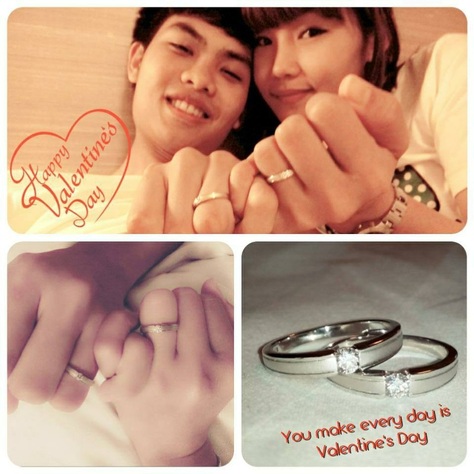|
Funny things happen in Thailand connected to “The Day of Love”, also known as Valentine’s Day. If you consider these things over time, trends become apparent. I have been pondering 3 reports from the past week:
Pong and Noey got engaged. Three guys got married to each other creating a news sensation for their 15 minutes of fame. Thailand got listed as the world leader in adultery, several points ahead of Denmark. Once upon a time, before the Internet and Facebook, you could count on two things about an engagement in Thailand: first, it would not even be hinted at until it was formally announced; second, it would involve at least the tacit consent of both families because a marriage was the beginning of a merger of two clans. Before that an engagement involved the exchange of assurances and the Thai form of dowry, the groom presenting the bride’s family gifts to compensate them for the contributions they had made in raising her. Those negotiations could be somewhat tedious in the old days, but they assured social stability no matter what might happen to complicate things afterward. Today the romantic form of love has triumphed. A couple will decide for themselves to get married and let the families know, maybe on Facebook. So Pong and Noey made their formal announcement of engagement on Valentine’s Day, and showed us their matching engagement rings. Assuming the three fellows are serious rather than playing a social network joke (one of the guys is nicknamed “Joke” so there is some suspicion about their announcement) in what sense are they possibly married? They are certainly not married in the legal sense. Thai law does not recognize same-sex marriages or three-party marriages. So they cannot have their marriage registered as hundreds of couples did on “The Day of Love”. Bang Rak district in Bangkok is the unofficial capitol of Valentine’s Day, since bang rak literally means “a place of love” (bang also means a waterway, referring to a canal that used to go through the district). Couples line up in the dead of night to be sure of getting their marriages registered on that auspicious day and place. The 3 guys might still be married in the social sense, which includes at least tacit agreement from families. They will solidify their place in their many overlapping social circles by how they stay connected and contribute to the needs and projects their social groups undertake. In Thailand Buddhism exercises no authority over marriages per se. There is no dogma to be considered nor even any necessary religious ceremony. They said they poured water. Water pouring is a sacred (but not necessarily a Buddhist) ceremony to ratify a covenant and seal it. So they are married if they say so, but we’ll see. We were less than startled to learn that Thailand leads the world in percentages of adultery. The statistics say that 56% of the married people surveyed admitted to having had an adulterous affair. Thailand, in fact, was the only Asian nation in the top-ten. I would like to offer some short-hand observations about that. Based on life here in the village, far fewer than 50% of the marriages here have ever ended. There is considerable family stability and the welfare of children is almost never jeopardized by family affairs. Since the marriage survey would probably be heavily slanted toward urban respondents, and since the nation is still heavily village and small town dwellers it could be that the statistics are a bit off. Nevertheless, I would submit that: Monogamy was mandated at least in part to counter the charge that polygamous cultures were uncivilized and would be better off if they were subjected to social improvement by colonial powers. That rationale has never had a very strong hold on Thai thinking and behavior. Nor has polygamy ever seriously undermined the social structure or the central authority of the family-clan. In the past, before “modernization” under the influence and sometimes considerable pressure from Europeans, marriages of young people in the upper social strata were arranged in order to strengthen social and political alliances. They were not necessarily limited to one wife or husband. Meanwhile, individuals caught in arranged marriages felt free to seek solace and satisfaction outside those official marriages as long as they did not endanger the social structure or the ranking inside the families and clans. They were married to the first spouse for status and the next one for love. Even though those extra marriages were not always official (although they often were), there was social pressure for patrons to accept responsibility for everybody involved. In other words, “adultery” and “bigamy” are legal terms in these modern times, but as pejorative terms they do not have a great deal of social support. Simultaneous multiple spouses, of course, are expensive and so this form of polygamy is more common among those who can afford it. It is less apt to happen in villages like ours. So is LOVE undergoing change? If you are a romantic, you would say, “Love is being accorded its true place in the hierarchy of values.” If you are a traditionalist, you would say, “Love is an emotional experience that appears in direct proportion to hormone secretion. It is not a sound basis for building relationships.” As a long-term observer, I have to say that the 3 guys are pushing the frontier in trying to establish a 3-way gay relationship if they are hoping to avoid social consequences. I will also say that Pong is a modern young man getting engaged and telling the world about it before consulting his parents. Nevertheless, we will support him and hope to meet Noey very soon.
0 Comments
Leave a Reply. |
AuthorRev. Dr. Kenneth Dobson posts his weekly reflections on this blog. Archives
March 2024
Categories |
| Ken Dobson's Queer Ruminations from Thailand |
|

 RSS Feed
RSS Feed
